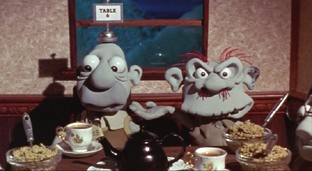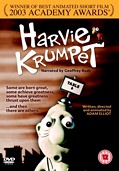Winning an Oscar cuts little ice here at Outsider, something I have already whittered on about at some length in a post-Oscar ceremony article on the subject. But most of films nominated in the short film categories are generally worth a look, in the main because there is no multi-million dollar market for these works and their existence is often the result of grants, awards, called-in favours, arts funding, or diligent saving. Animated shorts in particular are usually hugely time-consuming and sometimes expensive to produce (a single film can take a year to make, and those making it still have to eat even if they have borrowed the film equipment and begged the film stock), and once the film is complete there is rarely a guaranteed commercial outlet for it, giving the animators and their investors scant chance of recouping the budget. As a result, the animated short remains one of the purest examples of film as art, created from a combination of vision and dedication and often genuinely auteurist works, with the director also serving as writer and chief (or even sole) animator. With many not even employing voice artists, there is no 'interpretation' of the director's original intentions, and with the emphasis on artistic expression rather than feeding audience expectations, the animated short is often the most experimental film form that you will see up for major awards of any kind.
That's not to say that the Academy still doesn't like to play it safe. As with feature films, big stories – biographical works and those spanning a lifetime or even an era – are favoured over the avant garde, which is still seen by the establishment as a little too scary for widespread acceptance. Thus while Nick Park's hugely entertaining, technically excellent but very audience-friendly films have landed him three Oscars to date, some of the most visionary animators – Jan Svankmajer and the Quay Brothers are two that spring immediately to mind – have never even been nominated. (Every now and then, though, something jaw-droppingly experimental slips through, as with Zbigniew Rybczynski's 1983 win for the brilliant Tango.)

Last year, unassuming 32-year-old Australian animator Adam Elliot landed the big prize with a film that manages to conform to Oscar win expectations and at the same time gently kick against them. As with several past winners and nominees (including this year's winner Ryan), the film looks at a man's life, but the very specific charm of Harvie Krumpet is that that the subject of the film, the Harvie Krumpet of the title, never achieves anything of note and lives a life largely comprised of disappointment and misfortune, laced with the odd moment of revelation and short periods of happiness. Effectively, Elliot makes a big story out of a small one – Harvie makes no real impact on society as a whole (save for a couple of disparaging headlines) and indeed on very few people individually. A bit like most of us, then.
The use of narrational voice-over to tell the story is something I do not usually warm to, and initially this, coupled with the resolutely unspectacular nature of the tale, proved a little distancing. But it is this very matter-of-factness, coupled with Geoffrey Rush's wonderfully deadpan delivery, that provides much of the film's humour and cumulatively makes Harvie such an engaging and oddly memorable creation. Voice-over is key to Elliot's storytelling style, and in the extras he states that "Animation is not the most important thing – the narration drives the film." Though he was actually referring to one of his earlier works, this is as good a summary of his approach to storytelling as any, as while distinctively and imaginatively designed and nicely executed, the animation is never flashy or even particularly attention-grabbing, serving the story without ever drawing attention to itself.
It is inevitable that, as a claymation animator, Elliot's work would be compared to that of Nick Park, but the comparison is justified in more than just their chosen medium – Park is also a storyteller first, and his slick animation style is used to focus the audience on the characters. On successive viewings, this film began to remind me of Jane Campion and Gerard Lee's 1983 live action short Passionless Moments, which in similarly deadpan style feature a number of seemingly incidental but quirky observations that only achieve their full impact when viewed collectively.
Given the surface simplicity and the small-scale nature of the story, Harvie Krumpet is actually a rather surprising Oscar winner, but a pleasing one – with Elliot still early in his career as an animator, the award, rather that rewarding the already successful, is helping to promote a new and distinctive talent and a film that would otherwise be confined to the festival circuit. What effect this will have on Elliot's future career is anybody's guess, but it's worth remembering what happened to a certain young English animator in the years that followed his 1991 win for Creature Comforts.
I've watched the film four times now and have become increasingly seduced by the small detail that makes Elliot's approach to his character so distinctive – the 'pop' noise that occasionally escapes Harvie's mouth, the oddball 'fakts' (a mixture of truth and fancy) that appear on screen every now and then, the almost offhand way key events in Harvie's life (the death of his parents is a good example) are presented – but also by the sense of melancholy in the final act, a genuine sadness not just for Harvie, but for all of the Pleasant Paddocks nursing home residents, isolated from the real world and waiting at a fake bus stop for a bus that will never come. But the thing that even after the first viewing I just could not get out of my head was that ridiculously catchy song delivered by the religious visitors to the home, something obviously recognised by those assembling the DVD as it also plays over the main menu. "God is better than football, God is better than beer..."
| sound and vision |
Framed at 1.85:1, this is a nice enough transfer in many respects, with a sharp picture, solid colours and decent contrast. There is a little grain visible, but only just, and it is never distracting. Points are lost, however, because the transfer is not anamorphically enhanced, despite claims on the box artwork that it is. This is particularly frustrating given that the menus and one of the extra features ARE anamorphic. Whether this is specific to the review copy is uncertain, but it is disappointing, as zooming the picture up to fill a 16:9 screen inevitably degrades it.
There are two soundtracks available: Dolby 2.0 stereo and, according to the Setup menu, Dolby 5.1 stereo. As it turns out there is some rear speaker activity, but it is very low-key and the sound mix tends to be concentrated at the front. But separation here is very good, and the 5.1 track is definitely a crisper, more pleasing mix than the Dolby 2.0 one. Very occasionally – when Harvie gets hit by lightning, for instance – the subwoofer pops into life.
| extra features |
The extras here are not numerous, but nicely selected. There are actually more extras on the disk than listed on the menus or the packaging, but I'll get to that in a minute.
An excellent inclusion here is the director's commentary. Animator Adam Elliot provides us a wide range of information on the technical aspects of creating the film in the manner an old friend sharing interesting anecdotes over a drink. Given the do-it-yourself nature of the production there are plenty of fascinating tales to tell, my favourites being when the set that was taken over by ants (they had used icing sugar for snow) and Elliot's concern over full frontal Plasticine nudity.
Adam Elliot films very usefully includes not only Elliot's award winning trilogy of shorts Uncle (6:07 – 1996), Cousin (4:29 – 1998) and Brother (7:50 – 1999), but one of his very first stabs at animation, Human Behavioural Case Studies, Part One (1:11), made when he was a student at the Victoria College of Arts in the University of Melbourne in 1996 (where he also made Uncle). This very handy collection enables us to trace Elliot's style from his beginnings right up to Harvie Krumpet, and the process of development is very clear, in the design, the animation, narrative structure and use of narration. Brother in particular can be seen as leading directly to Harvie. Sound is generally a little fluffy on these, but these were no doubt made on a fraction of Harvie's less than extravagant budget. Human Behavioural Case Studies is framed 4:3 – well, a small 4:3 inside the 4:3 frame, as it happens – the rest non-anamorphic 1.85:1.
Not indicated anywhere on the disk or the DVD box is that Uncle, Cousin and Brother all feature commentary tracks by Elliot, which can be accessed by flipping to audio track 3 on the remote when the film in question is playing. Once again, these are a fascinating addition and tend to concentrate less on the technical aspects than on the autobiographical source of the three films, which were drawn largely from Elliot's own life and relations. There is some lovely anecdotal information here, and is well worth a listen just to hear how much of the three films (Brother especially) is based closely on fact.
Storyboard featurette (5:50) is framed anamorphic 16:9 and plays key sequences from the film at the top of screen while the storyboards for that scene scroll along the bottom, a technique that works very well and would be nice to see employed on other DVDs. The whole thing is narrated again by Elliot, who gives us some very interesting technical information – the low-tech approach to animating the TV screen is particularly memorable – as well as the fact that the film cost $390,000 dollars and took 14 months to shoot. Elliot is particularly pleased that not a single piece of CGI was used anywhere in the film. And so he should be.
Character model shots feature photographs of the models for Harvie, Ruby, Val and Hamish, which can be viewed from a number of angles using the arrow keys on the remote.
Finally there is a peculiar easter egg, accessed moving the cursor right on the Extras menu so that a cigarette appears in Harvie's mouth, treating us, if that's the word, to a heartfelt rendering of Danny Boy, though I'm afraid I don't know who is singing and probably should.
| summary |
Some may feel that £9.99 is a bit steep for a 22 minute animated short, but when you consider that the disk includes the director's entire filmography to date, almost all with commentary tracks, allowing us to trace the lineage of the film and observe the development of the film-maker's style, I think this is a fair price (especially since you can pick it up by looking around for at least £2 less). Indeed, it would be nice to see the work of other animators collected and presented in similar fashion, though can we have anamorphic transfers next time please? It's not as though disc space is at a premium here. In the meantime I'll go back to humming a catchy song about God being better than cricket, making 'pop' sounds with my mouth and dreaming of the disk that features the work of David Anderson, he of Deadsy and Door, in similarly friendly fashion.

